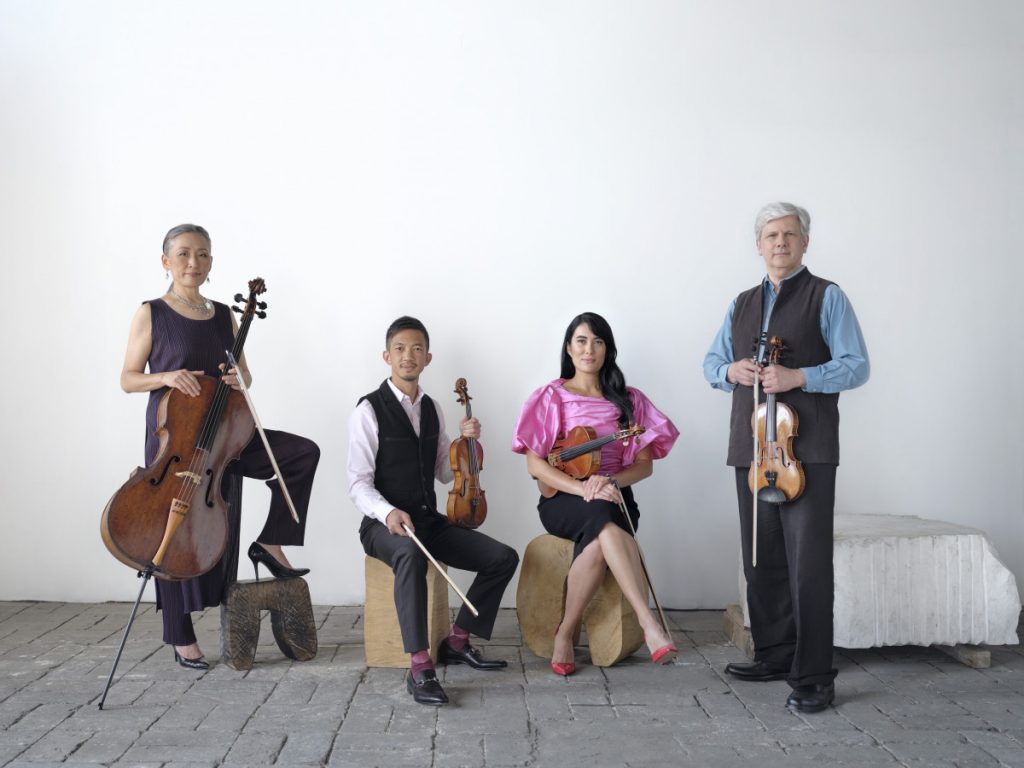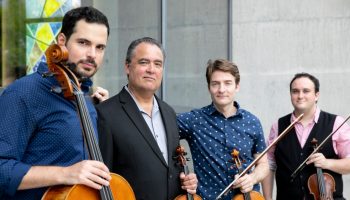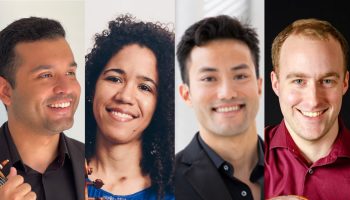
Sarah Russo
Staff writer
To satiate listeners hungry for beautiful music, Borromeo String Quartet is ready with much more than a “small salad,” said first violinist Nicholas Kitchen.
“We’re definitely preparing for the audience a wonderfully, rich meal,” he said. “These are works that both of those composers wrote were kind of at the height of their powers.”
Borromeo String Quartet is set to perform at 4 p.m. today in Elizabeth S. Lenna Hall as part if the Chautauqua Chamber Music Guest Artist Series.
In addition to Kitchen, the quartet in residence at the New England Conservatory since 1992 includes: Kristopher Tong, violin; Melissa Reardon, viola; and Yeesun Kim, cello.
Traditionally, first violin players are given the melody within an ensemble piece.
However, Kitchen said within chamber music for quartets, composers have the ability to “have fun with the role and change (it) constantly between four people.”
“There’s a role that I play (in) which I need to often be on that cutting edge of a musical motion,” Kitchen said. “And then again, the composer has a lot of fun with what can be done in conversation with that initial idea.”
Chamber music, as Kitchen describes it, is like an “active conversation between all four participants.” With the concert this afternoon, he said that will be evident in the selections they’ve chosen.
“What’s kind of exciting is that in both cases, these are two completely different people from completely different times, and they come from different cultures,” Kitchen said, “… and each one kind of has reached a level of musical fluency where they can just really create this almost other world for the audience as they’re listening.”
Borromeo Quartet’s concert begins with Béla Bartók’s String Quartet No. 5 in B Flat Major. Composed in 1934, this was Bartók’s penultimate quartet on commission from Elizabeth Sprague Coolidge. This piece has five distinct movements using an “arch” form, a central scherzo with two slow movements, which are then bookended by energetic fast movements.
“It’s just (an) elaborate thing where we’re imitating each other just at almost unimaginable speed,” Kitchen said. “And then it also has these sections … which are just so peaceful and contemplative and kind of have this really haunting kind of beauty.”
The quartet will conclude their program with Ludwig van Beethoven’s String Quartet No. 12 in E Flat Major. This piece is the first of Betthoven’s late quartets, six string quartets that comprise his final musical achievement. Even though the quartet was composed in 1825, Kitchen said the music is still relevant all these years later.
“There’s a profound peace, beauty and sense of meditation about the most important things that Beethoven really does that as well as any composer could ever expect to do,” Kitchen said.
The first and last movements of Beethoven’s String Quartet No. 12 are drastically different, Kitchen said. Beethoven’s music is “powerful” and Kitchen hopes the audience will feel “stimulated” by listening to each movement of the piece.
“They’re both like a rich tapestry,” Kitchen said, “the kind of feeling that one has as you’re interweaving all these things between the four instruments. It’s a gorgeous, rich piece even if you’re not queuing into all those details.”
“(There is) a richness of textures and imagination in these multiple layers of conversation going on inside the music,” Kitchen said.
Beethoven and Bartok are two historically significant and successful composers each with different backgrounds and musical styles. Despite their differences, Kitchen said the selections chosen from each composer are some of the best out there.
“You can’t really write music that is greater than these two pieces, and yet they’re very different,” Kitchen said. “(The program) is celebrating that ability to have these kinds of human feelings that are so varied and coming from these two very different masters at two different places.”




